It’s a rare political event that can draw applause from both the White House and environmental groups, but Lincoln Chafee’s victory in the Rhode Island Republican primary on Tuesday was just that.
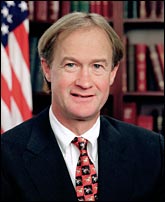
Lincoln Chafee.
The Bush administration reasons that Chafee — the most liberal Republican in the Senate, and frequently at odds with Bush on hot-button issues from Iraq to tax cuts — is their only hope of keeping a GOP hold on his Senate seat, given the overwhelmingly Democratic leanings of Rhode Island’s voter base.
Meanwhile, the Sierra Club and League of Conservation Voters — the only big national green groups that endorse political candidates — are heralding the victory of a moderate who has helped block some of the Bush administration’s worst environmental policies. “The environment is and must remain a bipartisan issue,” says Cathy Duvall, Sierra Club’s national political director. “And it’s leaders like Chafee who keep it that way.”
And yet Chafee is an anomaly among the 2006 Senate candidates being backed by the groups; in the rest of the cases, the enviros are rooting for Dems, who need to gain six seats to take back the majority in the Senate. (Sen. Joe Lieberman of Connecticut, who’s running for reelection as an independent after losing the Democratic primary, is also getting enviro backing, but he doesn’t threaten the chances of a Democratic majority.)
What makes this year’s Senate races particularly dramatic from the green perspective is that some of the GOP’s worst environmental offenders — Conrad Burns in Montana, Rick Santorum in Pennsylvania, and Jim Talent in Missouri — are up for reelection and embroiled in narrow races against newcomers with ambitious green platforms. Also running for reelection is one of the Senate’s strongest environmental champions, Washington’s junior senator Maria Cantwell (D), whose aggressive challenger is a former insurance executive getting big support from Big Oil.
One common thread connects all the races, says Duvall: “Voters and candidates alike are placing a huge emphasis on energy. High gas prices and escalating conflict in the Middle East have opened a Pandora’s box of concerns around meeting energy needs safely, smartly, affordably.” No wonder challengers are developing ambitious energy platforms, and incumbents backed by the fossil-fuel industry are nervous.
Montana: Conrad Burns (R) vs. Jon Tester (D)
It would be hard not to look green next to the Big Sky State’s three-term GOP senator, Conrad Burns — unabashed climate skeptic, advocate of human pesticide testing, beneficiary of $551,586 in campaign contributions from the oil and gas industry over the course of his career, and one of the “Dirty Dozen” members of Congress that LCV is most anxious to unseat.
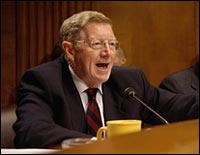
Conrad Burns.
But Burns’ challenger, Jon Tester, president of the Montana Senate and longtime organic farmer, is a strong environmental candidate in his own right. “Jon understands and champions sustainability on many levels — agriculture, energy, land use, and lifestyle,” says Theresa Keaveny, executive director of Montana Conservation Voters. “We are very proud to support him.”
As a state senator, Tester led the fight to pass a 2005 law requiring Montana to produce at least 15 percent of its electricity from renewable sources by 2015 — a victory that has already accelerated the development of wind farms in the state. Tester has also pushed hard to protect organic farms from “genetic drift” — contamination from neighboring genetically modified crops — and in the process faced off against Monsanto, chemical companies, and big grain growers in the state legislature.

Jon Tester.
Keaveny praises Tester for being a “stalwart supporter of enhancing public-land access for fishing, hunting, and recreation, steadfastly opposing all attempts to place these areas on the auction block.” Burns, she says, has expressed little opposition to the Bush administration’s efforts to privatize public lands.
Burns has earned a lifetime environmental voting score of 4 percent from LCV. According to the group, he has consistently voted against increasing fuel-economy standards, repeatedly sought to open the Arctic National Wildlife Refuge to drilling, and opposed numerous efforts to push the development of renewable energy. On the subject of global warming, the senator remarked in a recent Energy & Environment Daily interview, “[It] has been happening since the glaciers started to recede. You remember the ice age? It’s been warming ever since, and there ain’t anything we can do to stop it.” As if that weren’t enough, Burns was a leading recipient of campaign donations from disgraced lobbyist Jack Abramoff.
A recent USA Today/Gallup Poll of likely voters found the two candidates neck-and-neck — Tester leading with 48 percent to Burns’ 45 percent, a difference within the poll’s margin of error.
Pennsylvania: Rick Santorum (R) vs. Robert Casey Jr. (D)
Rick Santorum — as zealous an opponent of environmental protections as he is a Bible-thumper — is in serious danger of losing his Senate seat to state Treasurer Robert Casey Jr., in what could turn out to be one of the biggest upsets of this election season.
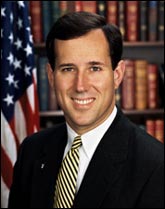
Rick Santorum.
Santorum — also a “Dirty Dozen” honoree, with a lifetime score of 10 percent from LCV and a zero score from Republicans for Environmental Protection for his voting record in 2005 — doesn’t put much truck in building a sustainable future. “Nowhere in the Bible does it say that America will be here 100 years from now,” he said at a 1994 political rally. This spring, Santorum pushed for the failed GOP energy package — ridiculed even by right-wing ideologues — that proposed a $100 gas rebate for drivers in exchange for opening the Arctic Refuge to drilling. And yet strong fuel-economy standards don’t strike Santorum as a good way to save drivers money: He has opposed efforts to increase them no less than six times. He’s also opposed efforts to promote the development of renewable energy and voted against the bipartisan 2005 Sense of the Senate resolution acknowledging that global warming is a human-made problem in need of federal action.
Says LCV’s senior vice president for political affairs, Tony Massaro, “Virtually every chance he gets, Sen. Santorum has voted for oil and gas interests and against the environment.”
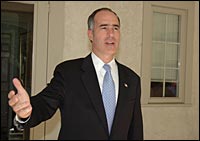
Robert Casey Jr.
While Casey has not had the opportunity to build a comprehensive environmental record as state treasurer, his environmental platform has been heartily endorsed by both the Sierra Club and LCV. Both Duvall and Massaro say his green vision would merit their support even if he weren’t running against a senator with an anti-environment streak. “Bob is very impressive,” says Massaro. “We think he has really solid environmental positions and would vote with us on the major issues.”
Casey has pledged support for an ambitious 40-mile-per-gallon fuel-economy standard, and says he would back a requirement that an increasing percentage of the U.S. electricity mix come from renewable sources. Santorum, for his part, voted against including such a requirement in the 2005 energy bill.
The two candidates also diverge sharply on the subject of controlling mercury emissions. This is a particularly controversial issue in Pennsylvania, home to numerous coal-fired power plants; virtually every lake, river, and stream in the state is under a fish-consumption advisory due to mercury contamination. While Santorum supported the Bush rollback of Clinton-era efforts to reduce mercury emissions, Casey supports an approach outlined by Gov. Ed Rendell (D) that would impose stricter limits on mercury emissions in Pennsylvania.
The latest USA Today shows Santorum trailing Casey by a whopping 18 percentage points among likely voters./Gallup poll

Maria Cantwell.
Washington: Maria Cantwell (D) vs. Mike McGavick (R)
Enviros have been relieved in recent weeks to see outspoken Arctic Refuge defender Maria Cantwell leading in the polls over her opponent, Mike McGavick, a former executive at Safeco Insurance Co. and top aide to former Sen. Slade Gorton (R), whom Cantwell defeated six years ago.
The first candidate endorsed by LCV and Sierra Club this election season, Cantwell has an 86 percent lifetime voting score from LCV. “She’s not just a reliable environmental vote, she’s been an incredibly gutsy and tireless leader on a host of issues ranging from fuel-economy standards to Superfund to the Arctic National Wildlife Refuge,” says Duvall. This year, Cantwell spearheaded a Democratic energy plan that proposes cutting U.S. dependence on oil imports 40 percent by 2020, slashing oil and gas subsidies, and promoting infrastructure development for biofuels.

Mike McGavick.
While McGavick has little in the way of a public-sector environmental record, he already has a bad rep among enviros. As an insurance industry lobbyist, he tried to ensure that taxpayers rather than polluters would have to pay for Superfund cleanups, according to LCV’s Massaro. This year, McGavick has gotten help from Alaska Sen. Ted Stevens (R) in raising money from the oil industry (Stevens harbors a nasty grudge against Cantwell for her successful efforts to prevent drilling in the Arctic Refuge). Duvall says McGavick “would be expected to heavily favor industry concerns over environmental protections if he won the Senate seat.”
According to a Sept. 6 Rasmussen poll, Cantwell has a 17-point lead over McGavick, boasting 52 percent of the likely vote compared to his 35. That’s a substantial jump for Cantwell since August, when she led by only six points.
Missouri: Jim Talent (R) vs. Claire McCaskill (D)
Missouri is another state where a pro-environment Democratic newcomer stands a decent chance of knocking out a right-wing Republican incumbent.
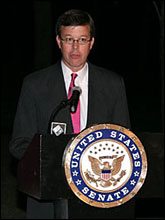
Jim Talent.
Jim Talent — yes, he’s also a “Dirty Dozen” designee and a low-scorer in LCV’s book at 15 percent — has supported the Bush administration’s efforts to weaken restrictions on toxic mercury emissions, despite widespread mercury contamination in his state’s water bodies. Talent has also been a strong supporter of Bush’s controversial Clear Skies program, criticized by enviros for weakening Clean Air Act protections, and an avid proponent of drilling in the Arctic Refuge. “With all due respect, I cannot understand what coherent political philosophy cuts its own country off from oil,” he said at a press conference in April. “It is time to open up the Arctic.”

Claire McCaskill.
Though challenger Claire McCaskill hasn’t established much of an environmental record as state auditor, she’s earned endorsements from both the Sierra Club and LCV. She has stated that “global warming threatens our way of life” in Missouri, and has made energy independence a central pillar of her campaign. In her comprehensive energy platform, she calls for 10 percent of America’s electricity to come from renewable sources by 2020. While there are some tenets of her energy plan that enviros might question, such as her call for further investment and research into coal liquefaction, Massaro is confident that McCaskill “would bring a dramatic improvement to Missouri’s representation on environmental issues.”
Recent polls show the two in a dead heat.


